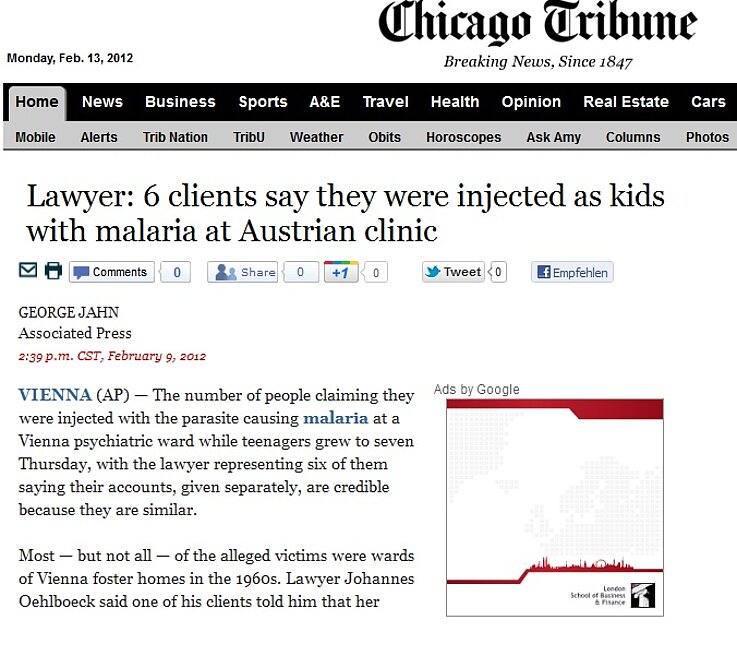The number of people claiming they were injected with the parasite causing malaria at a Vienna psychiatric ward while teenagers grew to seven Thursday, with the lawyer representing six of them saying their accounts, given separately, are credible because they are similar.
Most — but not all — of the alleged victims were wards of Vienna foster homes in the 1960s. Lawyer Johannes Oehlboeck said one of his clients told him that her parents took her to the clinic "because she was rebellious," while the daily Kurier quoted another as saying that he was dropped off by his parents after he insisted on becoming an actor.
The allegations — and the growing number of people making them — casts renewed focus on past practices at publicly funded Viennese institutions less than half a year after municipal authorities set up an independent commission to investigate allegations of systematic rape of young girls more than five decades ago at a foster home run by the city. That probe is still ongoing.
Oehlboeck said eight people who say they were juvenile psychiatric patients at Vienna's University Clinic in the 1960s spoke of painful or debilitating methods, including six who described the "malaria treatments."
He said all six told him that they quickly developed a high fever which was treated on alternate days with a quinine dosed sufficiently to reduce the symptoms. He said the treatment was ended after 14 days with an injection of what he said was likely a high dose of quinine, but not before the child's "blood was drawn and injected into the buttocks of another child."
Oehlboeck quoted one of the alleged victims as saying "the doctor said 'we are carrying out tests.'"
He did not name his clients. But Kurier carried a large photo of another alleged patient and identified him as Peter Schleicher. He was quoted as saying that his parents brought him to the clinic for treatment on the advice of one of his teachers after he insisted on becoming an actor.
Several victims complained of recurring bouts of high fever and shakes for years after the treatment, Oehlboeck said.
Such injections were an accepted method in the early 20th century to treat syphilis, with the resulting high fever killing the bacteria that caused the disease, while the malaria was kept under control by doses of quinine. Austrian physician Julius Wagner-Jauregg received the 1927 Nobel prize for medicine for developing this treatment.
But there also were experiments with treating psychological disorders through shots of the malaria pathogen. More recently, some physicians have experimented with inducing malaria to kill the HIV virus in trials that have been skeptically received by the medical establishment.
Bernd Kuefferle, a psychiatrist at the Vienna University Clinic during the 1960s, told the Austria Press Agency that some psychiatric patients were forced to undergo such "fever cures" to keep malaria pathogens alive for possible syphilis treatment.
New York internist Louis J. Morledge, whose focus includes travel medicine, said malaria could be transmitted by the method described by Oehlboeck. As for the symptoms described years later by the alleged victims he said they could be symptoms of other illness too but "they are certainly symptomatic of malaria."
Criticized last year for reacting too slowly to the mass-rape allegations, city officials have responded quickly to the malaria claims.
Vienna Mayor Michael Haeupl said Tuesday it is unclear if anyone underwent such treatment — and if so whether they were the victims of a crime or the targets of "outmoded medical treatment."
The federal Ministry of Science — which now runs the University Clinic together with the city of Vienna, said a hotline would be set up for those claiming to be victims.
"The accusations are being investigated very closely," ministry spokeswoman Elisabeth Grabenweger said.

